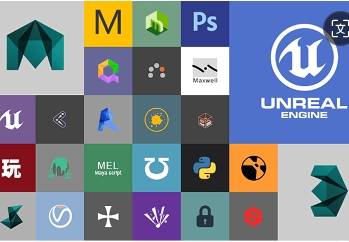Release date:2016, August 17
Duration:02 h 43 m
Author:Aaron F. Ross
Skill level:Advanced
Language:English
Exercise files:Yes
Bifröst is a fluid dynamics engine for high-quality liquids in visual effects, combining the best of volumetric and particle solvers in one tool. This course offers an overview of the Bifröst implementation in Autodesk Maya. Using emitter, collider, accelerator, and liquid property nodes, Aaron F. Ross simulates a medium-scale liquid effect and stores it to disk as a cache. Rendering the surface at full quality requires generating an animated polygon mesh; for a convincing layered material, he shows how to extract Bifröst channel data such as Vorticity and apply it in a shading network. The course concludes with a look at the Aero Solver for atmospheric effects.
Topics include:
Understanding Bifröst
Analyzing the node structure
Emitting from a polygon mesh
Colliding with objects
Pushing and damping fluid motion with accelerators
Caching Bifröst simulations
Meshing liquid and exporting to Alembic
Shading with the Bifröst liquid material
Designing mental ray materials
Layering shaders with Bifröst channel data
Adding mist with an Aero simulation
Texturing an Aero materialIntroduction
Welcome 1m 7s
Using the exercise files 3m 29s
1. Simulating a LiquidMeeting prerequisites 1m 56s
Understanding Bifrost 3m 55s
Choosing Bifrost Options 4m 38s
Setting the scene 2m 41s
Emitting from a liquid container 6m 50s
Analyzing the simulation 5m 42s
Pushing liquid with an accelerator 3m 38s
Optimizing Master Voxel Size 8m 1s
Colliding with objects 6m
2. Tuning and Storing a SimulationTuning Adaptivity 7m 42s
Culling particles with a killplane 3m 32s
Damping with the accelerator boundary layer 4m 44s
Writing a user cache 7m 6s
Reading a user cache 1m 30s
Meshing the particles 8m 41s
Exporting to Alembic 4m 47s
Referencing an Alembic mesh 6m 28s
3. Shading a LiquidShading a Bifrost liquid 7m 25s
Designing a subsurface scattering shader 3m 25s
Rendering global illumination 3m 16s
Designing a water shader 3m 20s
Connecting materials to a layered shader 3m 15s
Listing the active Bifrost channels 4m 50s
Masking a layer with Bifrost channel data 6m 29s
Combining channel data 9m 36s
4. Using Bifrost AeroEvaluating the shot 3m 18s
Emitting mist with aero 6m 24s
Connecting aero colliders 3m 44s
Damping aero with boundary layer 4m 24s
Shading with a Bifrost aero material 3m 36s
Masking density with Volume Noise 6m 48s
Conclusion Next steps 44s00. Introduction 01 – Welcome 02 – Using the exercise files.en.srt 02 – Using the exercise files
01. Simulating a Liquid 03 – Meeting prerequisites 04 – Understanding Bifröst 05 – Choosing Bifröst Options 06 – Setting the scene 07 – Emitting from a liquid container 08 – Analyzing the simulation 09 – Pushing liquid with an accelerator 10 – Optimizing Master Voxel Size 11 – Colliding with objects
02. Tuning and Storing a Simulation 12 – Tuning Adaptivity 13 – Culling particles with a killplane 14 – Damping with the accelerator boundary layer 15 – Writing a user cache 16 – Reading a user cache 17 – Meshing the particles 18 – Exporting to Alembic 19 – Referencing an Alembic mesh
03. Shading a Liquid 20 – Shading a Bifröst liquid 21 – Designing a subsurface scattering shader 22 – Rendering global illumination 23 – Designing a water shader 24 – Connecting materials to a layered shader 25 – Listing the active Bifröst channels 26 – Masking a layer with Bifröst channel data 27 – Combining channel data
04. Using Bifröst Aero 28 – Evaluating the shot 29 – Emitting mist with aero 30 – Connecting aero colliders 31 – Damping aero with boundary layer 32 – Shading with a Bifröst aero material 33 – Masking density with Volume Noise
05. Conclusion 34 – Next steps
Ex_Files_Maya_Bitfrost_Dynamic.7z
 Channel and
Channel and  Group
Group
1、登录后,打赏30元成为VIP会员,全站资源免费获取!
2、资源默认为百度网盘链接,请用浏览器打开输入提取码不要有多余空格,如无法获取 请联系微信 yunqiaonet 补发。
3、分卷压缩包资源 需全部下载后解压第一个压缩包即可,下载过程不要强制中断 建议用winrar解压或360解压缩软件解压!
4、云桥网络平台所发布资源仅供用户自学自用,用户需以学习为目的,按需下载,严禁批量采集搬运共享资源等行为,望知悉!!!
5、云桥网络-CG数字艺术学习与资源分享平台,感谢您的赞赏与支持!平台所收取打赏费用仅作为平台服务器租赁及人员维护资金 费用不为素材本身费用,望理解知悉!



评论(0)